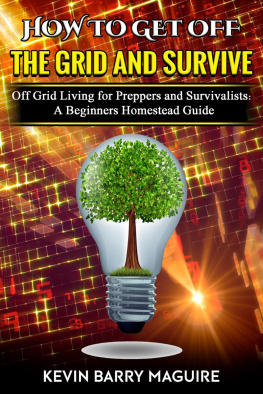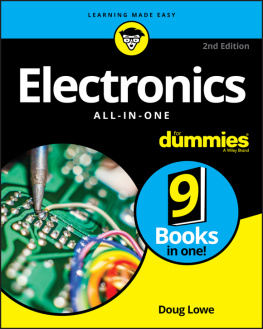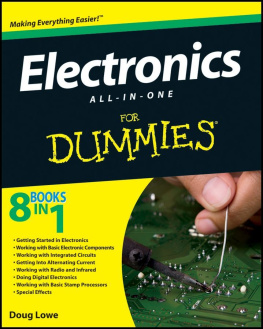I NTRODUCTION
Up until about 1800, we knew very little about the true nature of electricity, and no practical devices existed which used electricity. Its several manifestations were lab curiosities and interesting displays at sideshows and physics societies. It is by no means an overstatement to say that since 1800, advances in our knowledge and application of electricity have been one of the greatest marvels of modern times. The advances made have been unparalleled by any other field, by essentially any measure. This is not to disparage in any way the tremendous advances made in many fields over the past several decades, especially including the fields of biochemistry, nanotechnology, chemistry, manufacturing, and others. It is this authors desire to outline the amazing discoveries and inventions that have come about in electronics, and to describe some of the things electronics has enabled.
As in any field of development, there are names that quickly rise to the top, followed closely by other names near the top, and so on down to the many thousands of individuals, who though historically nameless, each made a contribution to the field. I wish to acknowledge all, but only the names of a few will have to suffice. All progress has come as a result of great people who built on the work of others, as expressed so aptly by Sir Isaac Newton: If I have been able to see further, it was only because I stood on the shoulders of giants.
And so it has been with electricity. All we have learned has come one little piece at a time, sometimes by serendipity, other times by great, focused effort. Step by tiny step, we learned more about the true nature of electricity. Step by tiny step we learned how to apply this knowledge to create useful products, which would not have been possible without this knowledge. And as more products were created, they further enabled more learning about electricity and the new products themselves. An example from the field of transportation illustrates this point.
Henry Fords process of mass production enabled the manufacturing of much less expensive automobiles, which in turn further enabled transporting goods, which in turn brought less expensive parts and materials, which in turn further reduced the cost of mass production. As each step improved, it further enabled closely related fields, which caused the improvements to loop back around and increase the improvements in mass production.
Over the decades, many individuals and organizations have published lists of the greatest inventions of mankind. I have seen many of these lists, and it is difficult to argue that each of the inventions listed is indeed very significant. Given my background in electronics, I always scan these lists looking for how many of them are directly a result of electricity, and in all these lists, one thing I have seen in common is that about one-third of them are.
These lists commonly include things like the wheel and the printing press, things which are pretty easy to understand, and things which have had (and continue to have) a huge impact on our daily lives. But these lists also usually include things like electricity, the telephone, radio, television, computers, the transistor, the integrated circuit, the Internetall things that also have had (and continue to have) a huge impact on our daily lives, but things which we generally do not understand very readily.
I was born an engineer; from the earliest I can remember, I always looked at things and asked myself how they worked. I asked my mother how a light bulb worked; I was fascinated how music could come out of a box that seemed to have nothing going into it (a radio); I could not fathom how a moving image of something could be transmitted through thin air (television). And when I eventually learned how radio and television work, my fascination grew even more. Every time I have a chance to learn how something works, I love learning about it.
I once had the opportunity to take a tour of a Boeing manufacturing facility in Seattle, Washington. It was absolutely fascinating to see how an airplane is put together. Now, every time I ride in a plane, I think of the walls of that plane that are protecting me, how the wings are built and how they function, how the engines work, and how all the systems of the plane come together to provide such an amazing system. This same kind of experience happens every time I learn how something worksI never look at it the same, and Im filled with amazement and gratitude that there are people and companies out there that can see a need, and design and build a product that meets that need.
I assume there are a lot of people out there who also enjoy learning about how things work; I know I have met a lot of them in my lifetime, and I have read many of their books and enjoyed them very much. Over the past 30 years, I have been continually fascinated by the major advances in our civilization that have been enabled by electricity and the inventions that depend on it. If you were to take away electricity, society as we know it today would totally disappear. We would be back to only steam or diesel-powered automobiles; there would be no airplanes; no telephones or cell phones; no Internet; no computers or computer-related equipment of any kind; no electronic entertainment industry (movies, video games, music); no stop lights; no public-address systems (sound amplification); no widely affordable books; no electric motors (which also means no refrigerators, air conditioning, fans, freezers, manufacturing equipment, pumps, etc.); no modern medical equipment (at least nothing that must be plugged in, which is most of it); and no lights (except for fires). Essentially, we would be back to about how things were in the 1850s, with the exception of a few advances that did not involve electricity in any way.
Electricity, and all the products that depend on it, have impacted our life in truly amazing ways. Today, most of those products are based on electronicsvacuum tubes, transistors, and integrated circuits. So if youve ever wanted to understand how those products function, this book is for you. It covers topics I have taught at the college level for many years, topics I have worked hard to help students understand. And I hope this book conveys my fascination with how amazing electronic technology really is.
This book takes the reader through the rudimentary history of electricity, up through the creation of electrical and electronic products, and describes several of these products and their impact on society and on further advances in electronics. This piece of our history and the changes it has wrought are truly some of the greatest marvels of our modern times.









